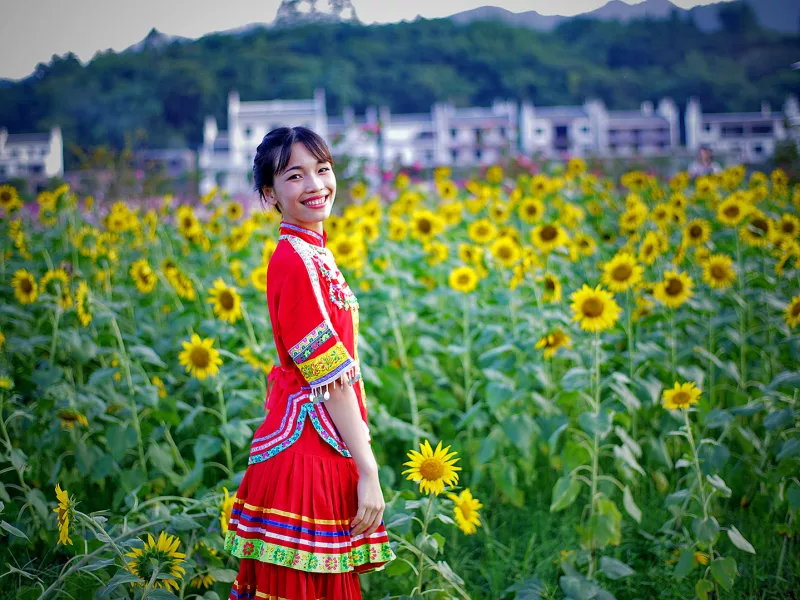Achang is one of the seven ethnic minorities with a small population in Yunnan Province. The national language is Achang language. It belongs to the Tibeto Burmese language family of Sino Tibetan language family. The language branch is to be determined. There are Langhe dialect and Husa dialect. It also knows the languages or dialects of other ethnic groups, such as Chinese and Dai. There is no native language and Chinese characters are used.
Achang people are mainly distributed in Husa Achang Township, Longchuan County, Dehong Dai and Jingpo Autonomous Prefecture, Yunnan Province, singsong Achang Township, Langhe County, Jiubao Achang Township, and the rest are distributed in Luxi, Yingjiang, Tengchong, Longing, Yunlong, and other counties. In addition, there are some Achang people in neighboring Myanmar. The iron wares made by Achang people are very famous, and they are famous for “Husa Dao”.

Faith
Due to the influence of multi-culture, the religious belief of Achang Nationality has formed a state of coexistence of various religions. Among them are nature worship, ghost worship, ancestor worship, Hinayana Buddhism, Han Buddhism, and Taoism.
Ancestor worship plays an important role in Achang’s religious belief. Zhepama and Jemima are the ancestors of human beings. The Achang people in Langhe area hold a grand would festival every year to commemorate and sacrifice them. The village god is the distant ancestor of the Achang people, and all villages offer sacrifices to him. In the concept of the Chang nationality, there are 3 souls after death, one is on the grave, the other is to give sacrifices every year, one is for the family hall, the other is for the festival, and the other is “Town God’s Temple”. Every year on the first day of July and the fifteenth day of August, we also worship our ancestors.
In the village of hula, in addition to offering sacrifices to Buddha, people also offered sacrifices to Guan Yu, earth Lord, God of wealth, and so on. The Achang people who believe in Han Buddhism and Taoism are only concentrated in a few villages in this area. There are also regular activities to offer sacrifices to the Jade Emperor every year. There are also professional or semi-professional religious personnel in the villages.

Diet
The Achang people eat rice as their staple food, supplemented by pasta, sour bamboo shoots, pickled vegetables, and other foods, and also like to eat braised pork.
Hula’s “hand rice noodles”, Lianghe’s yellow flower Baba and raw flake ginger are more distinctive national flavor food.
Achang people like drinking, and most people make rice wine by themselves. Most married women like to chew betel nut. In their spare time, they pass betel nut to each other, and their teeth are dyed black.

Clothes & Accessories
Achang costumes have their own styles, which vary slightly from place to place.
Traditionally, Achang men usually wear blue, white, or black skirts.
I’m wearing black trousers. Adult men in Lhasa also wear left-front coats. The young men of Husa Achang Nationality like white Baotou, while the young men of Langhe nationality like black Baotou.
Women’s clothes vary from place to place. There is no difference between married and unmarried women’s clothing of Husa Achang Nationality, which is very similar to that of Dai nationality nearby. The women’s tops in Lasa and Langhe are long sleeves and round lapels. They also wear silver collars, silver bracelets, and other accessories. There is a slight difference in the styles of Baotou made by married women in the two places. The Baotou made by Langhe women is about 33cm high, while the black Baotou made by Lasa women is round. The girl’s traditional dress is a light color cardigan with dark trousers. She wore an embroidered apron on her waist, her hair braid was on her head, and her hair braid was decorated with flowers.
Since the reform and opening up, some Achang women have bought cloth and lace to sew aprons instead of labor-consuming and time-consuming woven aprons. Its dress is moving towards simplification, pants instead of skirts, but also improved Baotou cloth. Many young people change to wear Han and Dai clothes, only the head decoration still retains some ethnic characteristics, but they still have to wear ethnic costumes during festivals and reception.

Festival
There are many festivals in Achang Nationality. From the national festivals of Achang people, we can see that they are influenced by the culture of Han, Dai, and Buddhism. There are many festivals of Husa Achang Nationality, such as the festival of throwing water, the festival of entering and leaving WA, the festival of burning white firewood, the festival of the torch, the festival of exchanging yellow slips, the festival of celebrating New Year, and the festival of watering flowers. These festivals are related to the belief of Hinayana Buddhism. Among them, the activity of “doing pendulum” has become larger and larger in scale in recent years, and it is also an important way of folk communication between Achang and Dai.
The most ceremonious national festival of the Achang Nationality is the “Aluwoluo Festival”. According to the wishes of the Achang people, it unifies the national and religious festival “would Festival” of the Achang people in Langhe area, which commemorates the legendary ancestors of human beings, such as Zhapama and Zhemima, with the traditional “Huijie Festival” of the Achang people in hula area of Longchuan. The “Aluwoluo Festival” is held from March 20 to 21 of the Gregorian calendar every year, marked by Qinglong and Baixiang. Since March 20, 1994, Achang people from all over the country celebrate the festival and send representatives from each village and branch to wish the festival together. The festival is rich and colorful. Achang people not only show their talents, songs, dances, and costumes to their guests and friends but also hold various friendship competitions. They have already broken through the limitations of religion and are developing in the direction of inheriting national culture, strengthening economic exchanges, and promoting national unity and progress.









